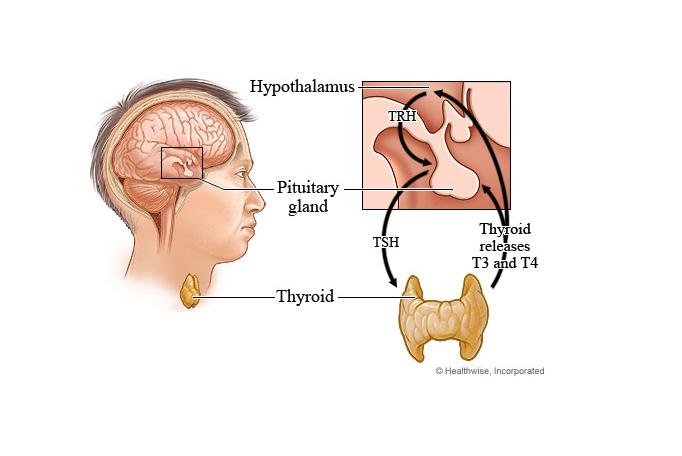The thyroid gland produces two thyroid hormones, triiodothyronine (T3) and thyroxine (T4), and releases them as needed by the body.
The hypothalamus and the pituitary gland help control the thyroid gland. The hypothalamus produces thyrotropin-releasing hormone (TRH), which stimulates the pituitary gland to release thyroid-stimulating hormone (TSH). A low level of T3 tells the hypothalamus to release more TRH, and it tells the pituitary to release more TSH. The thyroid gland releases T3 and T4 until the body is receiving the required amount.
What are the symptoms of thyroid nodules?
Most thyroid nodules do not cause symptoms and are so small that you cannot feel them. If your thyroid nodule is large, your neck may be swollen or you may be able to feel the nodule. In rare cases, you may also:
Feel pain in your throat or feel like your throat is full.
Have a hard time swallowing.Have a hard time breathing.
Feel nervous, have a fast heartbeat, sweat a lot, lose weight, or have other symptoms of hyperthyroidism (too much thyroid hormone).
Feel tired or depressed, have memory problems, be constipated, have dry skin, feel cold, or have other symptoms of hypothyroidism (too little thyroid hormone).
How are thyroid nodules diagnosed?
If your doctor thinks you have a nodule, he or she will do a physical exam and will ask you if you have symptoms or about any changes in how you've been feeling.
You may have tests to see how well your thyroid is working. Possible tests include:
A blood test to check the level of thyroid hormone in your body.
A thyroid scan to get information about your thyroid gland and nodules. Another test called an uptake scan can be done at the same time to see how well your thyroid gland is working.A thyroid ultrasound to see the number and size of nodules.
You may have a fine-needle aspiration to remove a small amount of material from the nodule to check for cancer.
If your nodule is not cancerous, your doctor will see you regularly to monitor the size of your nodule.
How are thyroid nodules treated?
If the nodule is not cancer (benign) and is not causing problems, your doctor will watch it closely for changes. But if the nodule is large or causing problems with swallowing or breathing, you'll need surgery to remove the nodule.
If your thyroid nodule is causing hyperthyroidism, your doctor may recommend a dose of radioactive iodine. This usually comes in a liquid that you swallow. Or your doctor may have you take medicine (antithyroid pills) to slow down the hormone production. In some cases, surgery may be done to remove an overactive thyroid nodule.
If your nodule is cancer (malignant), you'll need surgery to remove the nodule some or all of the thryoid. You may also need treatment with radioactive iodine to destroy any leftover cancer cells. After surgery, you may need to take thyroid medicine for the rest of your life.
© 2016-2019 Healthwise, Incorporated.








 Credit
Credit
